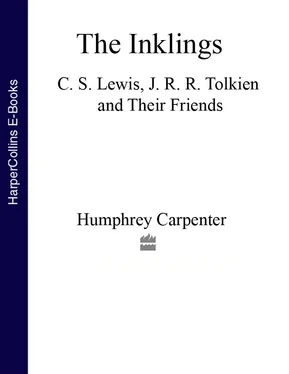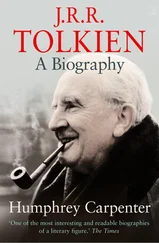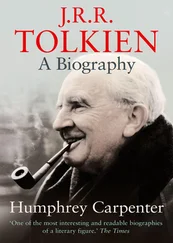‘My Life during the Exmas Holydays of 1907, by Jacks or Clive Lewis. Author of “Building of the promenad”, “Toyland”, “Living races of mouse-land” etc. I begin my life after my 9th birthday. On which I got a book from Papy and a post card album from Mamy. Warnie (my brother) was coming home and I was looking forward to him and the Xmas holydays.’
The boy had been christened Clive, but he always called himself Jacks or Jack. His brother Warnie, whose real name was Warren, was three years older than him, and went to a boarding-school in England. Jack always looked forward to Warnie’s return, because then they could paint pictures together or make up stories. Warnie liked stories about steamships and trains and India, while Jack liked to write about animals who did heroic deeds. But they usually managed to fit all this into the same story. While Warnie was away at school, Jack carried on with the stories by himself, when he was not learning things from Miss Harper, his governess, or from his mother, who taught him French and Latin.
‘Mamy is like most middle-aged ladys, stout, brown hair, spectaciles, kniting her cheif industry etc. etc. Papy of course is the master of the house, and a man in whom you can see strong Lewis features, bad temper, very sensible, nice wen not in a temper. I am like most boys of 9 and I am like Papy, bad temper, thick lips, thin, and generaly weraing a jersey.’
His father, who worked as a solicitor in Belfast, was changeable in mood, and Jack felt more comfortable with his mother, who behaved in the same calm affectionate way all the time. On the other hand it was his father who had bought all the hundreds of books which lined the study and the drawing-room and the cloakroom, and were stacked two deep in the landing bookcase, and filled the corridors and the bedrooms. Jack turned the pages of most of them in turn. One day he found these lines in a book of poetry by Longfellow:
I heard a voice that cried
Balder the beautiful
Is dead, dead.
He had never heard of Balder, but the words gave him an extraordinary feeling, a notion of great cold expanses of northern sky. He could not understand exactly what he felt, and the more he tried to recapture the feeling the more it slipped away.
There were lots of other books to read: the Beatrix Potter tales, Gulliver’s Travels in a big illustrated volume, and stories by Conan Doyle and Mark Twain and E. Nesbit. In the summer there were picnics on the hills and days by the sea, and there was always something to be done in the big house; so that the time passed quickly in a steady humdrum happiness.
Then one night not very long after his ninth birthday he woke with a headache, and when he cried, his mother did not come to him. There were lights in her room and a bustle of doctors and nurses. She had cancer. Jack prayed that God would make her better, but she went on being ill. On the day she died, the calendar in her room (which had a Shakespearian quotation for each day) bore the words: Men must endure their going hence, even as their coming hither. After that, everything changed. Jack would still have moments of happiness, but the old unshakeable comfort had gone. As he himself said, ‘It was sea and islands now. The great continent had sunk like Atlantis.’
First came the discomfort of being crammed into Eton collar, knickerbockers and bowler hat; then the clop clop of the four-wheeler driving him and his brother to the quay in Belfast; then the sea crossing, followed by his first sight of England, which seemed a sadly flat landscape after the Irish hills; then school.
Wynyard School in Hertfordshire had been moderately good when Warnie was first sent there, but by the time Jack joined his elder brother it was deteriorating as its headmaster became insane. For the next two years Jack had to endure grossly incompetent teaching, bad food, stinking sanitation, arbitrarily inflicted beatings and perpetual fear. It was a terrible introduction to the outer world, and its only good result was to drive the two brothers closer together for mutual protection. By the time the school finally collapsed and the headmaster was certified mad, Warnie had already moved on to Malvern College; the younger boy was sent briefly to a school in Belfast, then to another in England.
Meanwhile Jack continued to read voraciously. He had discovered most of the English poets by the time he was fifteen. He found The Faerie Queene in a big illustrated edition and loved it. He was delighted by the romances of William Morris. Best of all, one day he chanced across an Arthur Rackham illustration to Siegfried and the Twilight of the Gods, and felt the same sensation as he had known when he first read the Longfellow lines about Balder. ‘Pure “Northernness” engulfed me,’ he said; and he began a quest for everything ‘Northern’. Books of Norse myths, a synopsis of the Ring operas, Wagner’s music itself, all were food to his imagination. Soon he was writing his own poem on the Nibelung story, rhyming ‘Mime’ with ‘time’ and ‘Alberich’ with ‘ditch’ because he knew no better. He worked hard at his school-books, too, showing considerable aptitude for Latin and Greek. Yet there was no sense of stability, no ultimate feeling of safety, neither in the school term nor at home during the holidays, when even his brother’s companionship could not entirely lighten the oppressiveness of the big house, with its stuffy routine now dictated entirely by his father.
At the age of fourteen he won a classical scholarship to Malvern College.
*
‘Not only does this persecution get harder to bear as time goes on, but it is actually getting more severe.’ Fifteen-year-old Jack Lewis was writing home to his father from Malvern. ‘All the prefects detest me and lose no opportunity of venting their spite. Today, for not being able to find a cap which one gentleman wanted, I have been sentenced to clean his boots every day after breakfast for a week. It is after breakfast that the form goes through their translation together. From this I am cut off. When I asked if I might clean them in the evening (an arrangement which you observe would have made no difference to him), I received a refusal, strengthened by being kicked downstairs. So we go on.’
Malvern was no worse than most English public schools of the time, but it was no better. Warnie had been happy there – he left just as Jack arrived – but the elder boy was, at this stage in their lives, the more resilient. Jack almost immediately took a dislike to the place. It was not that the teaching was bad: far from it, for he was encouraged by a first-rate form master and was commended for excellent work. But academic study and the opportunity to read books seemed to play such a small part in the life of the place. Almost all the day it was bells ringing, feet running, shouted commands from older boys, little sleep and no privacy. Two things in particular alarmed him. One was homosexuality, especially the flirtations of the older boys with the younger. The other was the fact that Malvern, like many other public schools, was run not so much by the staff as by an unofficial clique of senior boys called ‘the Bloods’. Admission to this clique was not through formal qualification, but through being ‘the right sort of person’ and knowing ‘the right people’. Moreover once a senior boy became a Blood he had considerable power over his fellows. Bloods who had any tendency to be bullies would pick on those who showed resentment of their power. Jack Lewis did show such resentment. He was soon selected as an ideal victim, and after just two terms of persecution he had seen enough. What he was going through was no worse than what thousands of other boys at English public schools were enduring, but he had no intention of staying firm and enduring it. He was not that sort of person. When faced with something he hated, he did not tolerate it but went to war on it. And since he could not take on the Malvern Bloods single-handed he decided that he had better get away. He wrote to his father: ‘Please take me out of this, as soon as possible.’
Читать дальше












